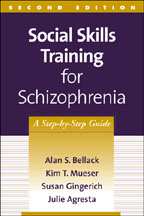 by Alan S. Bellack, Ph.D., Kim Mueser,Ph.D.,Susan Gingerich, M.S.W., & Julie Agresta, M.S.S.
by Alan S. Bellack, Ph.D., Kim Mueser,Ph.D.,Susan Gingerich, M.S.W., & Julie Agresta, M.S.S.
This resource is designed to facilitate group work in a range of settings. It presents tested formats and ready-made curricula for teaching social skills to schizophrenia clients.
Full Description:
Incorporating the most up-to-date concepts and clinical tools, the newly revised and expanded second edition of this popular manual is even more user-friendly than its predecessor. Presented are an empirically tested format and ready-made curricula for skills training groups in a range of settings. Part I takes therapists and counselors step by step through assessing clients' existing skills, teaching new skills, and managing common treatment challenges. Part II comprises over 60 ready-to-photocopy skill sheets (15 more than the previous edition), each one a complete lesson plan in itself. Other features of the second edition include an important new chapter on working with dually diagnosed clients; an overview of the empirical support for the approach; and additional assessment forms. Of special value for practitioners, the new 8.5" x 11" format makes it easier than ever to reproduce and use the practical materials in the book. Sample Activity
CONVERSATION SKILLSSKILL: Maintaining Conversations by Giving Factual Information RATIONALE: Asking questions is one way to keep a conversation going. Another way is to give factual information to the other person. This allows people to learn more about each other and the kinds of things they might have in common. Factual information is the kind of information that tells someone who, what, where, when, and how. STEPS OF THE SKILL:- Greet the person.
- Give some information to the other person.
- Judge if the other person is listening and is interested in pursuing the conversation.
SCENES TO USE IN ROLE PLAYS:- Telling someone at the Community Residence about an outing planned for the weekend.
- Telling a friend about a movie or TV show that you saw recently.
- Telling someone at your day program about a current event that interests you.
- Telling someone about a change in the local bus schedule.
- Telling a counselor about some hobbies that interest you
SPECIAL CONSIDERATIONS WHEN TEACHING THIS SKILL:- Group leaders should use the role play scenes to help members identify what information is appropriate to give in each situation used. Group leaders can discuss with members the importance of being discriminating with the type of information they provide in a given situation. For example, personal information that would be appropriate to provide to a counselor during a therapy session would not be appropriate to discuss with an acquaintance in a social setting.
- Group leaders may need to assist members with the identification of social cues required in Step 3.
Size: 8 1/2" x 11 - 340 Pages
I. PRINCIPLES, FORMAT, AND TECHNIQUES FOR SOCIAL SKILLS TRAINING OF CLIENTS WITH SCHIZOPHRANIA - Schizophrenia and Social Skills. The behavioral model of social skills/Summary
- Assessment of social skills. General issues/Interviewing techniques/Behavioral observation of role playing/Social problem-solving battery/Summary
- Techniques for introducing social skills. Social learning theory/Steps of soical skills trainging/Summary
- Techniques for Consolidating Social Skills. Homework/Pacing of social skills training/Additional teaching strategies/different training modalities/Summary
- Starting a Skills Group. Practical considerations when planning a group/Selecting group leaders/Selecting clients for group/Preparing clients for participation in group/Working with other mental health professionals to generalize skills/Summary
- Usuing Curricula for Social Skills Training Groups. Using an existing curriculum/Developing a new curriculum/Special considerations/Summary
- Tailoring Skills for Induvidual Needs. The role of assessment in setting individual client goals/Using client goals to design social skills training groups/Managing the range of skill levels/Keeping all members involved in the group process/Ongoing assessment of progress made in group/Summary
- Troubleshooting I: Common Problems and Problems with Highly Symptomatic Clients. Common problems in conducting social skills training groups/Problems related tohighly symptomatic clients/Summary
- Troubleshooting II: Problems with High-Functioning Clients and Dually Diagnosed Clients. Problems related to higher-functioning clients/Problems relaed to clients who abuse drugs or alcohol/Summary
- Reducing Relapse by Creating a Supportive Environment. Recognizing a stressful environment/The importance of family members and staff members in creating a supportive environment/Characteristics of supportive staff members and family members/Characteristics of a supportive living situation/Improving stress management in the client's environment/Developing a social learning milieu in a residential or inpatient program/Special considerations fro family members/Summary
II. STEPS FOR TEACHING 48 SPECIFIC SOCIAL SKILLS: CURRICULAR SKILL SHEETS Introduction - Conversation Skills. Listenting to others/Starting conversations/Maintaining conversations by asking questions/Maintaining conversations by giving factual information/Maintaining conversation by expressing feelings/Ending conversations/Staying on the topic set by another person/What to do when someone goes off the topic/Getting your point across
- Conflict Management Skills. Compromise and negotiation/Disagreeing with another's opinion without arguing/Responding to unture accusations/Leaving stressful situations
- Assertiveness Skills. Making requests/Refusing requests/Making complaints/Responding to complaints/Expressin unpleasant feelings/Expressing angry feelings/Asking for information/Making apologies/Letting someone know that you are afraid/Refusing alcohol or street drugs
- Community Living Skills. Locating your missing belongings/What to do if you think somebody has something of yours/What to do when you do not understand what a person is saying/Checking out your beliefs/reminding someone not to spread germs/Eating and drinking politely
- Friendshiip and Dating Skills. Expressing positive feelings/Giving compliments/Accepting compliments/Finding common interests/Asking someone for a date/Ending a date/Expressing affection/Refusing unwanted sexual advances/Requesting that your partner use a condom/Refusing pressure to engage in high-risk sexual behavior
- Medication Management Skills. Making a Doctor's appointment on the phone/Asking questions about medications/Asking questions about health-related concerns
- Vocational/Work Skills. Interviewing for a job/Asking for feedback about job performance/Responding to criticism/Following verbal instructions/Solving problems/Joining ongoing conversations at work
Epilogue: Tips for effective Social Skills Training APPENDICES Appendix A: Materials useful to group leaders Appendix B: Materials related to assessment References Index
Stock- Usually ships in 3-4 business days!
|